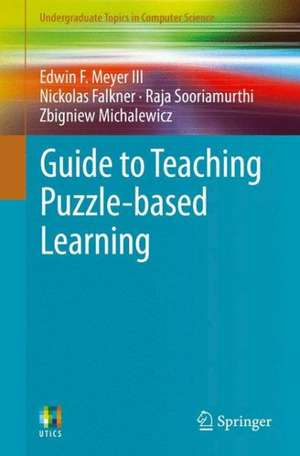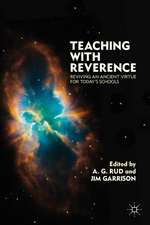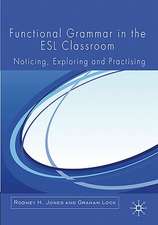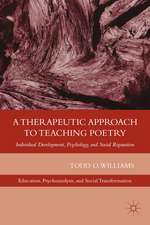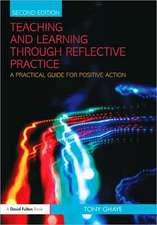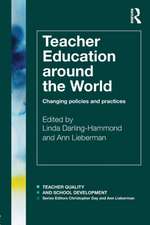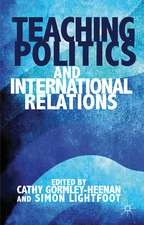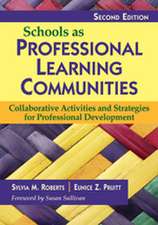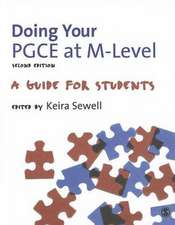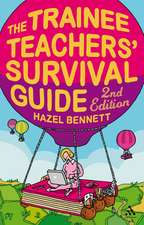Guide to Teaching Puzzle-based Learning: Undergraduate Topics in Computer Science
Autor Edwin F. Meyer III, Nickolas Falkner, Raja Sooriamurthi, Zbigniew Michalewiczen Limba Engleză Paperback – 4 aug 2014
Din seria Undergraduate Topics in Computer Science
- 20%
 Preț: 304.13 lei
Preț: 304.13 lei - 20%
 Preț: 233.75 lei
Preț: 233.75 lei - 20%
 Preț: 350.89 lei
Preț: 350.89 lei - 20%
 Preț: 306.58 lei
Preț: 306.58 lei - 20%
 Preț: 187.22 lei
Preț: 187.22 lei - 20%
 Preț: 272.43 lei
Preț: 272.43 lei - 20%
 Preț: 280.93 lei
Preț: 280.93 lei - 20%
 Preț: 245.43 lei
Preț: 245.43 lei - 20%
 Preț: 305.61 lei
Preț: 305.61 lei - 20%
 Preț: 258.79 lei
Preț: 258.79 lei - 20%
 Preț: 376.76 lei
Preț: 376.76 lei - 20%
 Preț: 246.39 lei
Preț: 246.39 lei - 20%
 Preț: 336.99 lei
Preț: 336.99 lei - 20%
 Preț: 341.22 lei
Preț: 341.22 lei - 20%
 Preț: 192.73 lei
Preț: 192.73 lei - 20%
 Preț: 306.72 lei
Preț: 306.72 lei - 20%
 Preț: 384.11 lei
Preț: 384.11 lei - 20%
 Preț: 316.07 lei
Preț: 316.07 lei - 20%
 Preț: 374.37 lei
Preț: 374.37 lei - 20%
 Preț: 225.03 lei
Preț: 225.03 lei - 20%
 Preț: 226.65 lei
Preț: 226.65 lei - 20%
 Preț: 375.54 lei
Preț: 375.54 lei - 20%
 Preț: 395.05 lei
Preț: 395.05 lei - 20%
 Preț: 307.17 lei
Preț: 307.17 lei - 20%
 Preț: 254.37 lei
Preț: 254.37 lei -
 Preț: 334.89 lei
Preț: 334.89 lei - 20%
 Preț: 227.16 lei
Preț: 227.16 lei - 20%
 Preț: 304.37 lei
Preț: 304.37 lei - 20%
 Preț: 316.24 lei
Preț: 316.24 lei - 20%
 Preț: 287.03 lei
Preț: 287.03 lei - 20%
 Preț: 342.46 lei
Preț: 342.46 lei - 20%
 Preț: 276.82 lei
Preț: 276.82 lei - 20%
 Preț: 237.35 lei
Preț: 237.35 lei - 20%
 Preț: 374.20 lei
Preț: 374.20 lei - 20%
 Preț: 304.44 lei
Preț: 304.44 lei - 20%
 Preț: 297.28 lei
Preț: 297.28 lei - 20%
 Preț: 579.37 lei
Preț: 579.37 lei - 20%
 Preț: 298.18 lei
Preț: 298.18 lei - 20%
 Preț: 243.35 lei
Preț: 243.35 lei - 20%
 Preț: 302.80 lei
Preț: 302.80 lei - 20%
 Preț: 297.66 lei
Preț: 297.66 lei - 20%
 Preț: 300.89 lei
Preț: 300.89 lei - 20%
 Preț: 191.36 lei
Preț: 191.36 lei - 20%
 Preț: 278.11 lei
Preț: 278.11 lei - 20%
 Preț: 304.21 lei
Preț: 304.21 lei - 20%
 Preț: 389.96 lei
Preț: 389.96 lei
Preț: 335.24 lei
Nou
Puncte Express: 503
Preț estimativ în valută:
64.15€ • 68.60$ • 53.49£
64.15€ • 68.60$ • 53.49£
Carte tipărită la comandă
Livrare economică 14-19 aprilie
Preluare comenzi: 021 569.72.76
Specificații
ISBN-13: 9781447164753
ISBN-10: 144716475X
Pagini: 364
Ilustrații: XVI, 345 p. 117 illus., 19 illus. in color.
Dimensiuni: 155 x 235 x 28 mm
Greutate: 0.51 kg
Ediția:2014
Editura: SPRINGER LONDON
Colecția Springer
Seria Undergraduate Topics in Computer Science
Locul publicării:London, United Kingdom
ISBN-10: 144716475X
Pagini: 364
Ilustrații: XVI, 345 p. 117 illus., 19 illus. in color.
Dimensiuni: 155 x 235 x 28 mm
Greutate: 0.51 kg
Ediția:2014
Editura: SPRINGER LONDON
Colecția Springer
Seria Undergraduate Topics in Computer Science
Locul publicării:London, United Kingdom
Public țintă
Lower undergraduateCuprins
Part I: Motivation and Teaching.- Motivation.- Getting Started.- Icebreakers.- Effective Teaching Approaches.- Part II: Tools, Tips and Strategies.- Understand the Problem.- Reasoning: Logic and Reasoning Backwards.- Pattern Recognition.- Enumerate and Eliminate.- Simplify!.- Perform a Gedanken: “What If?” and “So What?”.- Simulation and Optimization.- Part III: Challenges.- Probabilistic Reasoning.- Logical Reasoning.- Geometric Reasoning.- Grand Challenges.- Summary.- List of Puzzles.
Recenzii
From the book reviews:
“The book’s approach is to present many problems, and for each one, discuss how to present it to students and how to help them learn in the course of working on it. … this book does a very nice job of bringing together an impressive collection of puzzles and presenting them to teachers in a manner that supports their use in an undergraduate classroom.” (S. L. Tanimoto, Computing Reviews, November, 2014)
“The book’s approach is to present many problems, and for each one, discuss how to present it to students and how to help them learn in the course of working on it. … this book does a very nice job of bringing together an impressive collection of puzzles and presenting them to teachers in a manner that supports their use in an undergraduate classroom.” (S. L. Tanimoto, Computing Reviews, November, 2014)
Notă biografică
Dr. Edwin F. Meyer is an Associate Professor and Chair of the Department of Physics and Astronomy at Baldwin Wallace University, Berea, OH, USA.
Dr. Nickolas Falkner is a Senior Lecturer and Associate Dean of Information Technology in the School of Computer Science at the University of Adelaide, Australia.
Dr. Raja Sooriamurthi is an Associate Teaching Professor in the Information Systems Program at Carnegie Mellon University, Pittsburgh, PA, USA.
Dr. Zbigniew Michalewicz is an Emeritus Professor of the School of Computer Science at the University of Adelaide, Australia. He also holds Professor positions at the Institute of Computer Science, Polish Academy of Sciences and at the Polish-Japanese Institute of Information Technology.
Dr. Nickolas Falkner is a Senior Lecturer and Associate Dean of Information Technology in the School of Computer Science at the University of Adelaide, Australia.
Dr. Raja Sooriamurthi is an Associate Teaching Professor in the Information Systems Program at Carnegie Mellon University, Pittsburgh, PA, USA.
Dr. Zbigniew Michalewicz is an Emeritus Professor of the School of Computer Science at the University of Adelaide, Australia. He also holds Professor positions at the Institute of Computer Science, Polish Academy of Sciences and at the Polish-Japanese Institute of Information Technology.
Textul de pe ultima copertă
Puzzle-based Learning is a foundational approach to develop the critical thinking skills and mental stamina essential for solving real-world problems.
This Guide to Teaching Puzzle-based Learning provides invaluable insights drawn from the authors’ extensive experience in teaching Puzzle-based Learning. Practical advice is provided for teachers and lecturers evaluating a range of different formats for varying class sizes, based on results from classes taught in many different countries.
Topics and features:
This Guide to Teaching Puzzle-based Learning provides invaluable insights drawn from the authors’ extensive experience in teaching Puzzle-based Learning. Practical advice is provided for teachers and lecturers evaluating a range of different formats for varying class sizes, based on results from classes taught in many different countries.
Topics and features:
- Suggests numerous entertaining puzzles designed to motivate students to think about framing and solving unstructured problems
- Discusses models for student engagement, setting up puzzle clubs, hosting a puzzle competition, and various warm-up activities
- Presents an overview of effective teaching approaches used in Puzzle-based Learning, covering a variety of class activities, assignment settings and assessment strategies
- Examines the issues involved in framing a problem, and reviews a range of problem-solving strategies
- Contains tips for teachers and notes on common student pitfalls throughout the text
- Provides a collection of puzzle sets for use during a Puzzle-based Learning event, including puzzles that require probabilistic reasoning, and logic and geometry puzzles
Caracteristici
Presents a range of general problem-solving strategies that transcend disciplines Highlights the importance of introspection and the value of meta-level reasoning in the problem-solving process Examines the development of the student in terms of their understanding of knowledge and epistemological progress Includes supplementary material: sn.pub/extras
